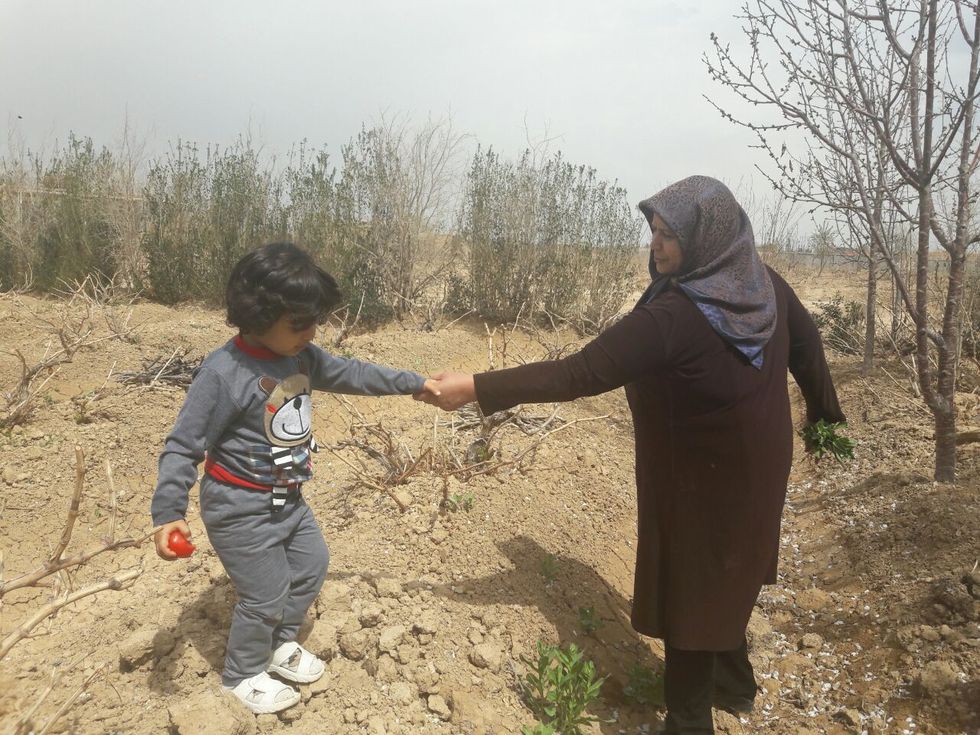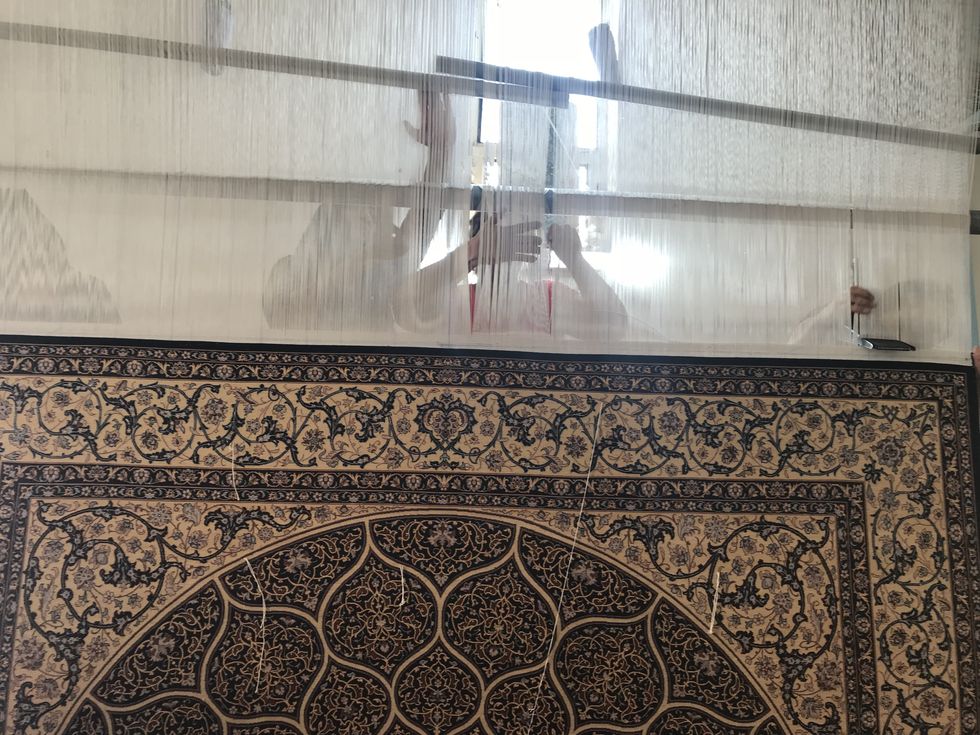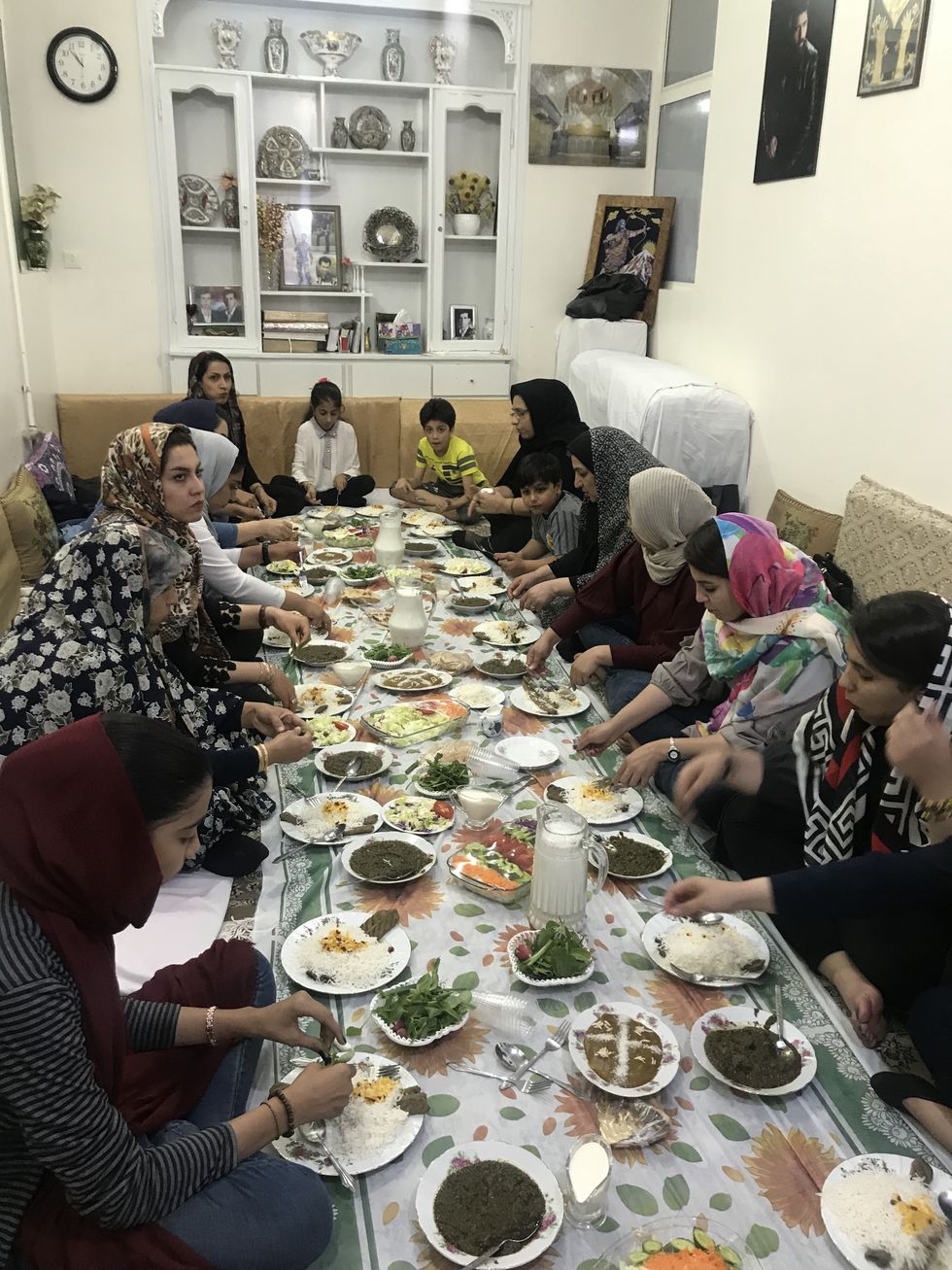For the latest installment of ELLE’s partnership with The Delacorte Review, two Iranian writers, Mahsa Afarideh* and Somayeh Malekian, spoke to women—specifically mothers and daughters—about their candid experiences and the generational trauma borne out of spending their formative years growing up in Iran. Below, read an excerpt of their reporting.
There have been so many paragraphs, anecdotes, general news about the world, or other things that I thought of as the beginning to step into my side of the story here. But, as all adult life is about, making a decision and picking one out of the options is what defines who we are.
And it seems that with this beginning, I am seeking your understanding and eventually your forgiveness. Forgiveness of what, I do not know yet.
It was my first session with that therapist, Ms. M. I was led to a small room with two chairs, a table, and a tissue box on it. There were no decorative objects in the whole room or on the walls except for a small frame hanging on the wall with a sentence I will never forget: “Understanding everyone is forgiving everyone.”
—Somayeh Malekian
Mahsa, 43, Poet, Tehran
I’m dancing with my friends. I think it is my birthday party. I am drunk. I am happy. Suddenly the door opens and my mother in black veil enters the room and gives me a hard look. She is going to kill me. I am not wearing a hijab. I am surrounded by boys. My heart starts pounding.
And I woke, shaking, sweating, breathless. Again, that hunting nightmare which probably won’t leave me til I die.
I remember exactly the day it started. I was five years old. My cousins and I were playing some stupid game. They made me a bride, redded my lips with a color pencil. One of the kids said “let’s go out.” As soon as I stepped out, I saw my mother walking down the alley. She gave me the same stern look that still appears in my dreams. I ran back to the house.
I’m now 43 years old and afraid of posting a single picture of myself without a scarf on Instagram. So I wonder if I have religiophobia. I know how religious beliefs can harm children, especially girls, in a religious family.
Somayeh Malekian, 39, Journalist, Tehran/London
I was born in a small room of an old house at the end of a long, dark dead-end alley which was not asphalted at the time and would become muddy all of the fall and winter. It was a big house with a huge yard in the middle and around six or seven rooms around it. There was a stable for the two cows of the extended family where some sheep and lots of hens were also kept. I remember two turkeys among the herd as well.
We are five. Though I make this tense mistake. We “were” five siblings before we lost our third brother in a terrible bus accident about eight years ago. Now we are four, me and my three brothers. Mehdi and Ali are older and Hossein is younger than me.
Sona, 20, social work student in Europe
As told to Somayeh
I was born in 2001, a second child of a Turk family in Shiraz, a beautiful historical southern city in Iran.
My mother was 18 when she got married to my 22-year-old father. She had lost her own parents at a very young age. Her marriage had been a way to move from her father’s house, where she took care of her younger siblings.
The last year of her high school, my mom sold sandwiches she had made at home to help my dad make ends meet. She got pregnant with my brother Soroush when she finished high school. She still tells the story of sitting at the nationwide university entrance exam when she was pregnant with my brother.
I was born four years after that, and it seems that their life started to boom then. My father got a proper job in the oil industry in the south of the country and my mother started to spend more time with us.
As close as I was to my father, I always struggled keeping my distance from my mother. I wanted to stay away from her, no matter how hard she would try to approach me on different occasions in my childhood, through my teenage years, and even now that I am 21.
I know that she herself went through a lot in her childhood after my grandmother’s death. Maybe it is why she always wanted to be supportive to me. She wanted to be my patience stone. She wanted me to trust her enough to tell her about the first time I was dating someone in high school. I could never trust her.
She tried to buy my trust, but I always and still resisted. I rarely hug my mother and only kiss her once in the New Year and once on our birthdays. That’s it. This is the distance I defined.
I still remember the day that I later realized was the moment my mother found out that my father was cheating on her. I was only four. It was full of shouting and breaking dishes and throwing phones and stuff at each other.
There was a young woman, a second cousin of a relative or something, who used to regularly come to our house as we were the only relatives she had in town. I liked her a lot. She was young and kind and would play with me anytime I asked her.
Until the night there was a big fight between my mother, father, and this girl. I wasn’t at an age to understand what was going on. But I got the deep hatred between my mother and her.
I blame myself for being more angry at my mother for her cheating than my father’s. I realized that she had an affair with someone; she had an extra phone hidden in her bag. It was a spring afternoon I think. I was in the second grade. My mom had come back from work and was about to take a nap on the sofa in the living room. It was just me and her at home and I asked if I could buy an ice cream for myself. She said I could grab some money from her purse in their bedroom. I went to the room happily to take the money. The moment I was looking for her wallet in the purse, my hand touched the hidden phone.
It was an old classic Nokia 0011, very easy to unlock. And there it was. A long list of a chat with a man I want to name Ali here. A man who was not my father. A man that I did not know and had exchanged many love messages with my mother. I was frozen from shock. But I had to quickly leave for the ice cream. I couldn’t let anyone know that I knew.
Mahsa
It has been more than a month that I haven’t seen my child. Amid our marital problems, I applied for divorce and throughout the process, my husband took our child and wouldn’t let me see her. Now he was hiding her from me. As if I could kidnap my own child.
According to law, I am entitled to custody of her before the age of seven. She is four. When I went to family court seeking help they said it was absolutely my right to see my child, but they couldn’t do anything about it. It was my own job to convince my ex-husband. So one day I couldn’t bear it anymore and I went to the door of my ex-brother-in-law. They didn’t open the door. I went to a car repair shop nearby and bought some gasoline and a match box from a supermarket. I emptied the bottle all over my clothes and with the match in my hand I went back to their door. I shouted, “I want to see my child. Either you let me in or I will burn myself alive right here in front of your building.”
Khadijeh, Somayeh’s mother
As told to Somayeh
I used to sort of murmur this song at the carpet workshops, but later sang them loudly along with my friends when I could manage a 15, 20 minute escape when no one was around. We would sing and dance together. My friends would tell me to sing. They said I had a voice.
I stopped singing after some point. I think because I could not sing at our own house and later I got married and I never had the time or spirit of singing. My dad was against music and of course dancing. He would frown at us and shout if our brothers could see our hair.
It seemed as if being happy was haram—forbidden—in our house. My dad used to say that Satan would get happy if he heard the sound of laughter.
So, those 10 or 20 minutes of escape were time to be happy and sing.
We had two or three other days in a year to have the whole house for ourselves. It was the grape harvest season in summer when not only my father and brothers would go to the farm to harvest their fruits, but our mothers had to go with them to help so the grapes would not rot on trees.
It meant that all house chores were on us daughters. But we would do all the work at home so fast, cleaning and preparing food for when they return, and then we had the rest of the day for ourselves.
My friends would come to our house because we had a pond and we could go into the water and play.
We would undress and go play in the water. We could happily scream and shout and sing and dance without anyone around to hear us. Those were probably the happiest times of our childhood, when we would laugh loud and could hear our friends laugh.
I got married when I was 13. I had never seen my husband before we religiously became man and wife.
I remember that I had come back home from carpet weaving for the lunch break and was taking a short nap before leaving again. It was when my sister, Fatemeh, 15 years my senior, woke me up, saying, “Hey, you! Get up! Do you know it is all about you? We are marrying you off. We are going to send you out of the nest.”
I remember the strange feeling in my stomach. I got up and quickly grabbed my chador and went to the carpet workshop. I told one of my mates there who was two or three years older than me. I told her what my sister had said. She soothed me saying this is what all of us had to do sooner or later.
I was too shy to ask about any details like who the person is, or what I have to do. I had no one to ask. It was too much of a taboo for a girl to talk about.
Once my friend Batoul got married, she stopped doing carpet weaving. Even if she was living just a few alleyways from our house, I was not allowed to go there. I did not know why.
When I told my other friend at the workshop that I had visited Batoul, she frowned at me with disgust. She asked if we have discussed what she does with her husband. She told me it was very inappropriate for a girl to visit a newly wedded woman.
Then came the day that my in-laws-to-be came to our home for the first time. They were served with tea and fruit and then the men of the family wrote the marriage contract and left. No one asked me anything.
A few days after the contract signing, we had the religious ceremony of marriage. I was extremely shy and could not look at his face. I would keep my face down not to look at him.
It was a strange feeling sitting beside a man who I did not know at all. I did not raise my head even when I wanted to put the gift watch my mom had bought for him around his wrist. Of course I did not look at him either before or after he put a necklace around my neck.
Mahsa
How on earth can anyone understand what you mean by “I attempted suicide for a pair of jeans?” Yet it is what I did when I was 15.
After saving up for months I finally bought a pair of black jeans. I loved the blue ones but I knew my mom would never let me wear blue jeans. Here was my mom’s rule: Any light color or any piece of clothes that attract attention are forbidden for girls and women. So she had this monthly or weekly ritual of rummaging through my stuff to find anything that could possibly violate that rule, something like a pair of white socks. It turned out that according to my mom black jeans were an “eye catcher” too.
When I got home I went directly to my room (which actually was not “my room,” we never had our own rooms; it was just a room that I shared with my younger sister and brother and often with guests). My mom came right after me, without asking any question, grabbed my shopping bag, took out the jeans, and said I should go to the shop the next day and give them back.
Then she went to our neighbor. That night I couldn’t blink an eye, thinking, “I don’t want to live anymore.” It was not just the stupid jeans. Wearing something that I loved was never a dream that would come true in my whole life. Since I was a little girl I always felt ugly in the clothes that she permitted me to wear.
So the next day I found some mouse poison in the pantry, stirred it in a glass of water and drank it. I still remember the taste of it.
I had a friend named Farnaz who often came to our door; then we walked to school together. I still don’t know in what condition my mom found me but that day my friend came, my mom let her in, so she absolutely knew what was happening. Farnaz took me to hospital and there they saved me and sent us home, without bothering to wonder why a 15 year old girl tried to kill herself.
The saddest part—it still bothers me—was that my mom knew what I had done and did absolutely nothing. She never mentioned a word about it. If Farnaz hadn’t come over that day, I doubt that my mom would’ve done anything at all to save me.
Raha, 35
I was four when we left Qom for Khorramabad. I loved to play with kids on the street but Mom would not allow it. Once I was about five, I went out around sunset time with a skirt instead of wearing pants. Mom came and dragged me back home and hit me hard with the stick and piece of hose. She bruised me badly.
I’d love to go to religious chanting ceremonies along with Mom. To me it was a fun recreational thing to do as I would play with other girls and have sweets together. I remember once I wore a pair of long, black women’s socks to join mom in her religious meetings and my sister mocked me for wearing them because she found it to be very ugly. But I did it anyway.
Mom was pathologically obsessed about religious purity. If I would fall while playing and my leg would bleed, it was not the pain that would bother me but the thought that my mom would start many rounds of washing me so I would not bring the impurity of blood into our home.
I used to be terribly afraid of hell, as Mom would describe the tortures there with detail. She would tell me how I could be hanged by my hair in hell if I showed it in public. I always had this question in mind: “Why should I be hanged?”
Mahsa
I told my mom that I was writing or trying to write something, and I wanted to talk to her.
“It’s a kind of interview, about you, about me, about us.”
“Okay. Feel free. Call me whenever you have time.”
The next day she called and said that she had already written her memories and would send them to me. She asked me if I can find a way to publish them, or maybe I can write a screenplay based on them.
“Or it can be a series! There are a lot.”
When I receive the mail, my hands start to shake. It is a heavy package, five notebooks, each one 100 pages, blackened by her sloppy handwriting, front and back of every single page. But it is not the weight of notebooks; it is the weight of her stories that shakes my hands.
I start to read:
At dawn, my mother woke me up. She poured some boiling water in a pot and said, “Take your sister to the yard. Wash your hands and then come back for breakfast.” Last night she had dyed our hands with Henna. My baby sister was three years old. I was five. When we were out in the yard, before going to pee, I asked my sister to wait for me. But she said that she had some secret to share with mom and didn’t want me to know it, so she went back inside.
When I was in the water closet, which was quite far from the main building, I heard a deafening voice of our neighbor, an old woman, screaming, “My God! My God!” I came out and saw that the stair was blocked by a heap of rubbles.
“What happened?” I asked the old woman.
“Nothing, nothing,” she said as she asked another neighbor. “Take her out of here!”
People were gathering around the ruins which only five minutes ago was my home.
“I want to go to my dad! I want to see my sister! I want my mom!”
“For God’s sake, someone takes this poor child out!”
My father’s cousin and her husband adopted me. They had no children. They treated me with a lot of love and kindness. But people started talking. They started spreading nasty rumors: Her foster dad will finally marry her! I was five and he was 45. He was one of the nicest people God has ever created. After a year they adopted another child and my father’s cousin’s behavior changed. I became the babysitter of the new child. In the afternoons I wasn’t allowed to go out to play with the children of the neighborhood. She started to beat me whenever I went out.
There are five pages in the first notebook about this woman. About how angry she was and how she used to shout at my mom, how she beat her. This woman passed away 10 years ago at the age of 75. When I was young she was always very kind to us.
I want to call my mom and ask her why. Why after so many years she still talks ill of that poor woman who now probably is nothing more than a bunch of bones in her grave? I want to tell my mom that maybe that woman didn’t know better too. But I don’t. Because I know what she has been through, I know that very well, maybe too well.
So maybe I should tell her, “Do you forgive me for not forgiving you?”
*Mahsa Afaridah is the pen name of an author living in Tehran whose confidentiality we want to ensure given the current political situation in Iran.
This excerpted reporting was published in collaboration with The Delacorte Review. You can read the full story here.
Mahsa Afarideh is the pen name of an Iranian poet who lives in Tehran.
Somayeh Malekian is an Iranian journalist who has covered Iran for American media since 2010. Prior to that, she enjoyed teaching English in several villages and towns around Iran for 10 years. Currently, she is an associate producer at ABC News international bureau in London.










